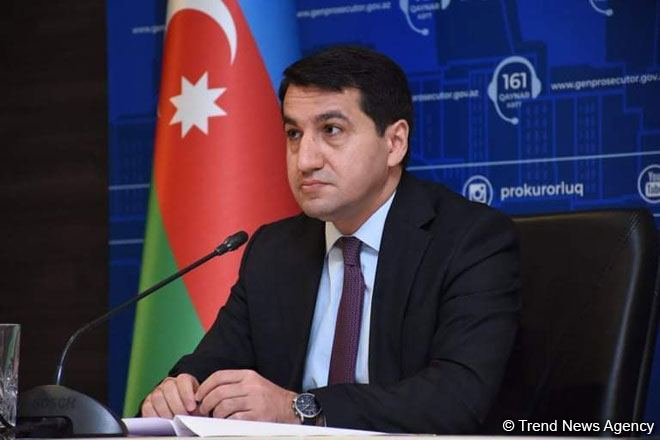BAKU, Azerbaijan, Oct. 12
Trend:
The SCUD missile is a medium-range ballistic missile capable of carrying nuclear warheads, Assistant to the President of Azerbaijan, Head of the Foreign Policy Department of the Presidential Administration Hikmat Hajiyev told reporters in Azerbaijan’s Ganja city, Trend reports on Oct. 12.
“In general, if we consider the recent military operations in the world, then this is one of the very unique cases when a ballistic missile with great destructive power was fired at a city with a population of more than 500,000 people,” assistant to the president added.
“This testifies that there are no moral, ethical rules, barriers, inherent in the world civilization, for the Armenian leadership,” Hajiyev added. "We regard this as vandalism and barbarism."
The heads of the diplomatic corps in Azerbaijan, ambassadors, military attachés, heads of representative offices of international organizations in Azerbaijan arrived in Ganja on October 12.
The purpose of the visit is to familiarize diplomats with the results of Armenian atrocities - the scenes of crimes committed as a result of Armenia’s irresponsible missile attacks against innocent civilians and the Azerbaijani energy infrastructure.
On October 11, 2020, at about 2:00 (GMT+4) Armenian armed forces fired missiles at multi-apartment residential buildings in the central part of Ganja, the second largest city of Azerbaijan, located outside the frontline zone.
According to the latest data, 9 civilians, including 4 women, were killed, 34 civilians, including 16 women and 6 children wounded, more than 10 of the buildings and over 100 objects of different designation damaged as a result of the missile attack.
The Armenian Armed Forces, flagrantly violating norms and principles of international law, the Geneva Conventions of 1949 and Additional Protocols to it, as well as the requirements of the humanitarian ceasefire declared on October 10th, continue to deliberately target the civilian population of Azerbaijan, and intensively bombard densely populated settlements.
Armenian Armed Forces launched a large-scale military attack on positions of the Azerbaijani army on the front line, using large-caliber weapons, mortars, and artillery on Sept. 27.
Azerbaijan responded with a counter-offensive along the entire front. As a result of retaliation, Azerbaijani troops liberated a number of territories previously occupied by Armenia, as well as take important, strategic heights under control.
The conflict between the two South Caucasus countries began in 1988 when Armenia made territorial claims against Azerbaijan. As a result of the ensuing war, Armenian armed forces occupied 20 percent of Azerbaijan, including the Nagorno-Karabakh region and seven surrounding districts.
The 1994 ceasefire agreement was followed by peace negotiations. Armenia has not yet implemented four UN Security Council resolutions on the withdrawal of its armed forces from Nagorno Karabakh and the surrounding districts.






